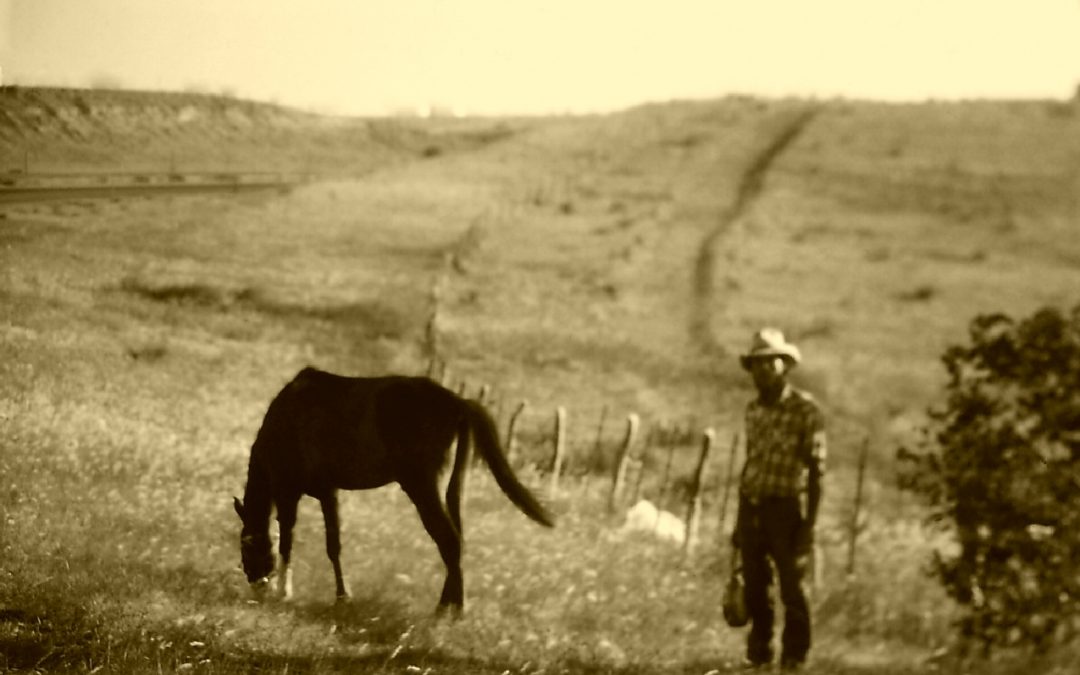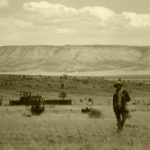I was giving Gizmo a drink from the radiator filler hose at a run-down Shamrock station outside of Briscoe, Texas. Grain elevators rose like launchpads in the distance, towering above the flat Texas Panhandle and clearly marking the route of the defunct Panhandle and Santa Fe Railroad. The rail line had long been a staple of the area with its concrete silos and sidetracked gondola cars.
The summer day’s clammy heat was diminished slightly by a welcome breeze. Gizmo had learned to take the curved black nozzle of the radiator hose between his teeth while I pushed the spring trigger to open the water flow. He could drink without spilling a drop, something that often amazed bystanders. I’m not sure just when they disappeared, but you don’t see those radiator filler hoses anymore.
“Hell, I got a horse that can do that,” the man said annoyingly.
I looked over at him but didn’t reply.
He wore a Texas Tech ball cap and a snap down western shirt with no sleeves. It looked like a wife-beater version of a cowboy shirt, so I thought of him as “Wife-Beater.” His Wrangler boot cuts covered the tops of brown work boots, and the right rear pocket below the leather insignia was burnished with a faded circle made by the round Red Man snuff can that lived there.
He drove a red Ford F-250 pickup, late sixties model. The truck was a three-quarter ton four-wheel drive with full floating axles, split rims, and an eight-foot bed that had seen its fair share of hard work and abuse. There were three gun racks bolted inside on the back of the cab that covered the back window and held various rifles; each served notice that this wasn’t a truck or owner to be trifled with. A blue heeler sat in the truck bed with his chin resting on the side, quiet and still, observant and intense, waiting for someone to cross the invisible vertical plane that separated the outside world from his own domain inside the truck’s bed and made them fair game.
“Ain’t nobody gonna mess with that truck,” the man said. “Hell, I don’t even lock the sonuvabitch.”
“He’ll pull a beer out of a cooler and open it, too. Just like that,” he said, snapping his fingers. “That horse don’t look like much of a rope horse,” he commented, looking at Gizmo.
“He’s not a rope horse,” I answered. I didn’t like Wife-Beater and tried to concentrate on watering Gizmo so we could be on our way.
“What the hell good’s a horse if you can’t rope off him?” he replied.
He was trying to be funny but was rubbing me the wrong way. I didn’t answer.
“You travelin’ or something? What’s with the rig?”
“Yep, travelin’,” I answered. “Just headin’ cross-country.”
“What the hell kinda gun you got there?” he demanded, indicating my Colt.
“Just an old single action Colt. Nothin’ special.”
“Got me a forty-four magnum under the seat there. It’ll put a hole in an engine block. Stop a car dead. See them rifles?”
I looked over at his pickup truck.
“A thirty-thirty, a three oh eight, and a little twenty-two long. I use ’em for KIE-oats.” He pronounced the word without the Spanish E on the end.
“You shoot coyotes with those things?” I asked.
“Yep, as many as I can find. Ain’t nothin’ better’n a dead KIE-oat. Got no use for ’em.”
I had seen thousands of rabbits every night out here on the flat prairie. They seemed to fill the plains with their numbers, eating the grain from the ends of the grass and devouring much of the feed that was meant for cattle in this part of the country. I only had to shine my flashlight into the darkness to see the pairs of eyes stretching into the distance, lit up as if electric. I wondered at the wisdom of killing their predators.
“Seems like there’s a lot of rabbits around here,” I mentioned.
“Yeah, hell they’re just a pest. I shoot them, too, but they don’t really hurt nothin’,” he replied.
“You don’t think they eat up the feed for the cattle?”
“Naw,” he said, “they couldn’t put a dent in all that pasture. It’s them damned KIE-oats we have to worry about. Them bastards’ll take down a young calf. And I seen ’em hamstring a two-year-old heifer. Sons-uh-bitches ain’t no good fer nuthin’. That’s why I keep them guns in my truck. I kill every one I find.”
“How many head you lose this year?” I asked.
“The outfit I work for didn’t lose any, but that’s because I’ve run most of the bastards off.”
I was used to this mindset, though I’d never gotten used to the outlook of killing and conquering anything that constitutes a threat. I’ve never been a bleeding heart, so I’ve never seen coyotes and other animals as poor victims so much as I see them as fellow travelers in our universe. I’ll admit, my first instinct was to wish the coyotes had guns, so that Wife-Beater could know what it was like to be hunted and driven from his home, have his family killed for no apparent reason, and face elimination by a foe who he hadn’t chosen and had no quarrel with. Sure, my initial reaction was to hate him. But I didn’t really see him as the bad guy, any more than I saw myself as a good guy.
I had done some reading back then, and I’ve read a lot more since. I knew that coyotes accounted for killing less than half a percent of all cattle in that part of the country, and that once a calf was over six or eight months old, there was pretty much no chance of a coyote getting him. So, a rancher would lose a calf for about every two hundred head he owned. Much as I don’t want to see calves killed, I figure that’s a pretty small price to pay for taking over another creature’s home. And it occurred to me that if things were reversed—if I wanted to take over the rancher’s home, if he were the “coyote” and I was the settler—I doubt he’d be as acquiescent as the coyotes had been for him. I’d have to fight him for it, and the price would be damned high.
“You kill a lot of coyotes?” I asked.
“Already got twenty-six of ’em this year. Got forty-two last year,” he replied. “Best year I had was fifty-seven. I get ’em at night with a light. Gub-ment pays me to kill ’em.”
There wasn’t anything I could say to Wife-Beater to convince him to change his mind about killing coyotes. It didn’t matter that they were (and are) my favorite critters, that I think they’re the smartest species alive, and that waking up surrounded by them, listening to their plaintive cries—in the Mojave, the Painted Desert, the mountains of Northern New Mexico, and even here in the grasslands of the Texas Panhandle—is the best way anyone could start their day.
Coyotes kill—it’s what any predator does—but they don’t set out to systematically eliminate a competing species from the face of the Earth. They take what they need and nothing more. They become the aggressor only when they have to. This is universally true of all creatures. A predator is a creature that kills and eats other creatures. Simple as that. But when applied to humans, its meaning defines a person who ruthlessly exploits others. Those who experience the world through Wife-Beater’s eyes somehow transpose the two meanings and come to believe that the animal is the ruthless exploiter.
The water began to flow out the side of Gizmo’s mouth, signaling that he was finished drinking. I pulled on the water hose, causing the coiling mechanism to click and automatically wind it. I turned toward a grain elevator in the distance, hoping for some loose oat or barley grain for him to eat.
Wife-Beater climbed into the cab of his truck and called out, “Hey, I’m goin’ out shootin’ tonight. You’re welcome to come along if you want.”
I shook my head, waved, and pulled Gizmo alongside me as I walked. I watched the predator drive away. Up until then, I hadn’t thought of us as prey.


